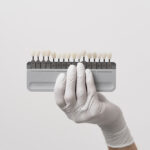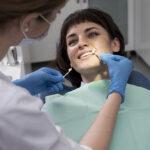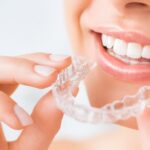Nowadays, at any stage of life, it is common to see people more open to trying new things, such as tattoos, hair color, clothing style and piercings. However, care must be taken with mouth piercings, as they can pose a health risk if not treated with due care.
Mouth piercings, especially tongue piercings, can be extremely dangerous to your health. We give OdontoLiuzzi We care about your health, and that's why we decided to address this issue to explain the risks that piercings can cause and what precautions must be taken to avoid any danger.
See the risks that this accessory can present to oral health.
Research on the risks of mouth piercing
In the survey of New York college students, 6% of those who had an oral piercing had some type of problem afterwards. This percentage is lower than the rates of problems associated with ear piercing (12%), nipple piercing (21%) and navel piercing (24%).
Although uncommon, some patients need to be admitted to the hospital and given intravenous antibiotics to treat infections on the tongue and floor of the mouth, says Dr. Sidney B. Eisig, professor and director of oral and maxillofacial surgery at Columbia University College of Dental Medicine in New York.
There are several instances where people have chipped or chipped their teeth with their piercings. One study revealed that nearly half of people who wore or had worn long barbell piercings (about 1.6 cm or longer) in their piercings for at least four years had some chips in their back teeth.
Recent studies suggest that the gum on the inside front of the mouth is more likely to recede if the tongue is pierced. This is because the piercing ends up exerting repeated pressure against the front teeth. after the gum retracts, the bone beneath it is resorbed by the body. This can make teeth loosen and then cause them to fall out.
Dentists also suggest that piercings can break some types of restorations, such as crowns made of porcelain or porcelain and metal. For this reason, some professionals recommend acrylic balls or barbells instead of metal.
What is a mouth piercing?
It is any type of piercing that can be on the tongue, lips or cheeks. In recent years, mouth piercings have become a form of individual expression.
Like the piercing in the ear, the earrings and metal rings placed in the mouth are of different styles and comprise pieces such as pins, screws and rings. But the piercing placed in the tongue, lips or cheeks involves greater risks than those placed in the ear.
Before piercing any part, inside or outside the mouth, talk to your dentist.
What risks can be caused by a mouth piercing?
One of the main dangers of getting a mouth piercing is the plethora of infections it can cause. In addition to the pain of getting a piercing on your tongue, lips, bridle or even cheeks, you have to consider the possible rejection. Not to mention the important consequences this can have for your oral health.
Most oral piercings cause swelling, redness, tenderness and bleeding. Cleaning the area can be more difficult and also painful. As a result, you may start not doing it correctly, resulting in possible infections.
Other mouth piercing risks include an increased possibility of trauma in the event of an accident or injury. Because they create an additional risk to oral health, oral and perioral piercings are not recommended.
Impact of piercings on teeth
Jewelry inserted into the lips and cheeks can seriously damage your teeth. The friction against your teeth when you talk or eat can chip tooth enamel, causing increased tooth sensitivity.
In addition, piercings can, in the long term, change the alignment of teeth to a greater or lesser extent. In the most serious cases, we can also talk about a broken tooth and serious infections.
gum sores
The gum is very sensitive, therefore, if it has constant contact with a metal object, problems that are harmful to oral health may appear.
The inner shaft of oral piercings can also affect the integrity of the gums. By rubbing the bottom of the teeth, the piercing can irritate the gums to the point of bleeding. In the worst cases, severe gingival recession can be observed. and that feeling that your teeth are loose. This loosening exposes the root of the tooth and, in addition to causing hypersensitivity, can cause serious infections.
Infection
This is a common risk when you decide to get a piercing. The professional who is responsible for the procedure indicates a series of precautions with hygiene, suspension of physical activity practices and restrictions on food, in order to avoid infections after placing the piercing.
Our mouth is a place susceptible to the appearance and proliferation of bacteria, after all, it is a humid, warm place and, if hygiene is not carried out satisfactorily, there may be the presence of food remains. Therefore, hygiene and care for mouth piercings should be increased.
The indication is always to wash your hands well before touching the piercing and keep your mouth hygiene up to date. Perform brushing carefully so as not to hurt the puncture site and visit the dentist for regular cleaning.
teeth damage
Large mouth piercings can cause damage to your teeth with any movement performed with them.
The habit of “playing” with the piercing in the mouth is common. And this habit of fiddling with the piercing can cause slight fractures that, little by little, can end up chipping the teeth.
As the tongue is constantly moving, a piercing in this location requires extra attention.
Endocarditis
Bacterial infections from tooth decay or piercing infections can affect the heart.
When the health of the mouth is compromised, the heart valves responsible for preventing pumped blood from returning are also compromised. Infective endocarditis happens when bacteria and microorganisms manage to permeate the blood stream, finding damaged heart tissue or abnormal valves.
Click here and learn more about endocarditis.
Compromised mouth functionality
In the first days after the hole, the speech and chewing are impaired. However, even after healing, the basic functions of the mouth can be compromised.
This happens because a tongue piercing, in addition to everything, causes an increase in saliva. This fact impairs basic functions such as chewing and speaking. With this, malabsorption of nutrients may occur, speech may be difficult, and you may also bite your tongue and have an excess of saliva when opening your mouth.
Other risks you run
Among the risks that affect oral health when incorporating a piercing are:
- Dental malocclusion, i.e. change in bite. This is due to the introduction of a foreign object into the area that can change the correct position of the tongue and jaw;
- Halitosis: can occur if there is not meticulous and constant hygiene of the piece, as the bacteria that cause the bad odor can lodge in these objects;
- Changes in the pronunciation of words: if the piercing is in the tongue, the problem may be more intense if any of the motor nerves are injured;
- Alteration of taste if there is nerve damage related to that ability;
- Allergies caused by the piercing material;
- Ingestion of the piece during sleep.
How long does a piercing last?
If you don't get any infections and your oral piercings don't interfere with the normal functions of your mouth, they can be worn permanently. But, be sure to go to the dentist if you experience any kind of pain or any other problem.
Because of the risks involved even after the piercing wound disappears (such as swallowing loose parts or damaging your teeth), the best thing to do is not get your mouth pierced.
Do you have questions? Talk to us
Although at first the biggest fear of those who are going to get a piercing in their mouth is the pain, they have multiple harms to their oral health. If you have decided to place it anyway, inform yourself in advance of the risks involved. And, of course, care to avoid future complications.
If you would like more information about mouth piercings or just ask a question, you can chat with us on Whatsapp. We are waiting for you!
Want to stay on top of more guidance? So like our pages on Instagram It is Facebook.











 per
per